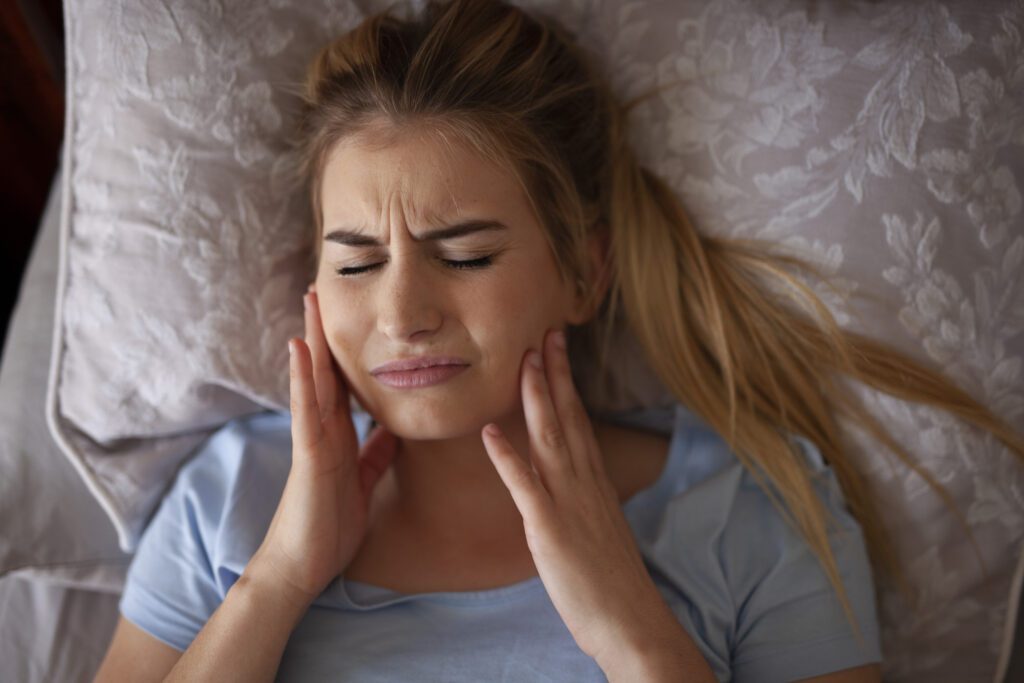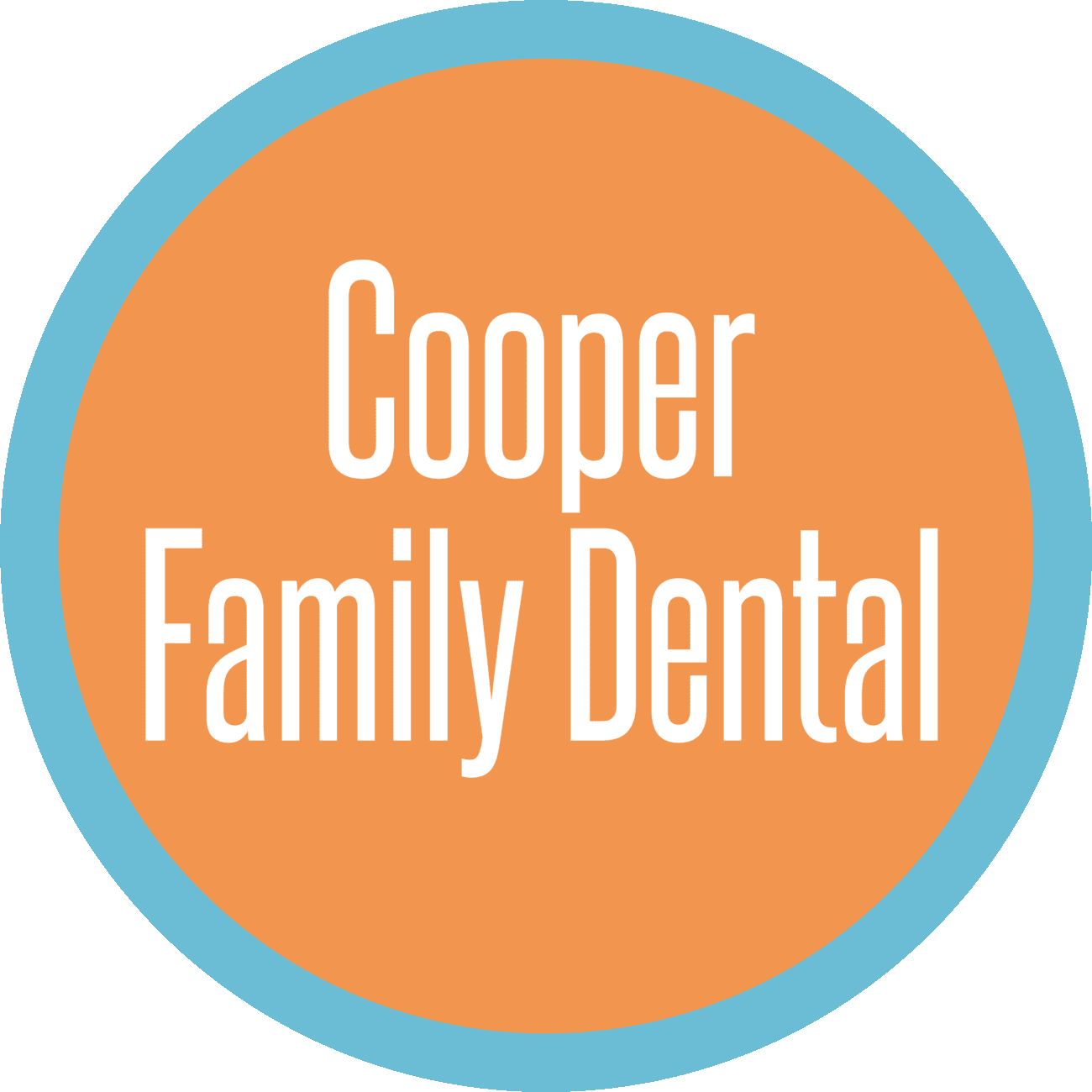If you often have jaw pain, wake up with headaches, or notice wear on your teeth, you might have a jaw issue called TMD. TMD stands for temporomandibular disorder, which affects the jaw joints. These joints, also known as TMJ (temporomandibular joints), work like sliding hinges that connect the jawbone to the skull. When these joints are strained by injury, stress, or other causes, it can lead to TMD, a painful and uncomfortable condition. Cooper Family Dental offers TMJ treatment in Arlington, TX
TMJ care can ease pain and improve how your jaw and teeth function. We also offer other restorative services to repair the damage already caused.

Common Signs of TMJ Disorders
TMD symptoms can appear in different ways, and some people may not even realize they have it. Here are some of the most common signs:
- Teeth Clenching and Grinding (Bruxism): This often happens during sleep or in stressful situations. Many people don’t notice it but wake up with sore jaws or worn teeth.
- Headaches and Migraines: Tightness in the jaw and facial muscles can lead to headaches. This is especially true if you grind or clench your teeth at night.
- Jaw Pain: Discomfort in the jaw, especially when chewing or talking, is a common symptom.
- Pain When Biting or Chewing: TMD can make eating uncomfortable, as it may hurt to open and close your jaw.
- Damaged Teeth: Grinding and clenching can cause tooth wear and even cracks in the teeth over time.
Many people don’t realize they have TMD because the symptoms often happen unconsciously. When people are stressed, they might clench their jaw without noticing. This extra pressure on the joints can lead to more grinding and damage.
Some common factors that contribute to TMD are arthritis, high stress, anxiety, and even crooked teeth. Treating these related issues can help lessen TMD symptoms.
How We Treat TMD in Arlington, TX
At Cooper Family Dental, we start by taking X-rays to get a clear view of your teeth, gums, and jaw. This helps us understand what may be causing your symptoms. There’s no single treatment for TMD, so we often use a combination of therapies to ease symptoms and help prevent future flare-ups. Here are some of the main treatments we offer:
Night Guards
A night guard is an appliance similar to a mouthguard that covers the upper or lower teeth. We start by taking an impression of your teeth to create a custom-fit night guard. We will send these impressions to a lab, which uses hard acrylic to make the guard.
When the guard is ready, we’ll have you come back in for a fitting to make sure it feels comfortable. Wearing this guard while you sleep can prevent grinding and clenching, protecting your teeth and helping to keep your jaw in a natural position. This can reduce pain and help prevent further damage.
Physical Therapy
Physical therapy can play a big role in relaxing the muscles around your jaw. By working with a physical therapist, you can learn exercises, get massages, and use heat therapy to ease muscle tension.
Many people find relief by working on their upper body muscles, including the shoulders, back, and arms. Tension in these areas can make TMD symptoms worse, so exercises that target these muscles can be beneficial. Adding these exercises to your daily routine can help reduce stiffness and pain in the jaw area.
Lifestyle Changes
We also suggest lifestyle changes to manage symptoms day-to-day. For instance, eating soft foods can help reduce the strain on your jaw, especially as you begin treatment. Softer foods don’t require as much chewing, so they put less pressure on your jaw and teeth.
In addition, the dentist may suggest medications in certain cases. Muscle relaxants or anxiety medications, taken before sleep, can help reduce the risk of grinding and clenching. Warm or cold compresses are also useful to relieve facial and jaw pain. Applying a warm cloth to the jaw can help relax tight muscles, while a cold compress can reduce inflammation if your jaw feels swollen or sore.
Bite Adjustment
Sometimes, the way your teeth align can contribute to TMD. Crooked or uneven teeth can put extra stress on the jaw. Straightening your teeth or adjusting them can reduce this stress. In some cases, we may suggest a dental crown or bonding to fix worn or broken teeth. By creating an even bite, these treatments help lessen tension in the jaw, making it easier to stop clenching and grinding.
If you’re experiencing any of these symptoms or think you may have TMD, our team at Cooper Family Dental is here to help. Contact our Arlington, TX office to discuss how we can help ease your discomfort and improve your jaw health.
TMJ Treatment FAQs
If you’re dealing with TMJ pain, jaw tension, or other related symptoms, here are answers to some common questions. We want to help you understand TMJ disorders and how to manage them.
How does posture affect the TMJ?
Your posture plays a big role in TMJ health. If you often hunch over your phone or computer, your head tends to lean forward, putting extra strain on your neck and jaw. This forward position can push your jaw out of its normal alignment and increase pressure on the TMJ and nearby muscles.
Make sure you sit or stand up straight, with your screen at eye level. Paying attention to your posture can help ease jaw, neck, and shoulder tension. Good posture may also lower the chances of a TMJ flare-up and make daily activities more comfortable.
Should I use heat or cold for TMJ pain?
Using either a warm or cold compress can help, but it depends on the type of pain you’re experiencing. If your jaw pain comes from an injury or feels sharp, try using a cold compress to reduce swelling and numb the pain. Place the cold pack on the painful area for about 15 minutes a few times a day.
If your TMJ pain feels more like muscle tension or stiffness, a warm compress is a better choice. Heat helps relax the muscles around your jaw. Just like with the cold pack, use heat for 15 minutes at a time throughout the day for relief.
What triggers TMJ flare-ups?
Several factors can lead to a TMJ flare-up. Common triggers include:
- Eating hard or crunchy foods
- Poor posture
- Chewing gum
- High stress levels
- Using your teeth to open objects
- Chewing on ice
Avoiding these triggers can help reduce TMJ pain. Simple changes, like managing stress and skipping tough foods, can make a big difference in daily comfort.
How long does it take to see improvement after starting TMJ treatment?
How fast TMJ treatment works depends on your specific problem and the type of treatment. Nightguards, stress relief, or jaw exercises often help within 2-4 weeks. You might notice less clicking and soreness.
For serious TMJ pain, treatments like physical therapy or medications may take 4 to 8 weeks to make a big difference. If you need dental work like a bite adjustment, relief can start right away but full improvement takes a few months.
Can sleep apnea make TMJ problems worse?
Yes. When you have sleep apnea, your breathing stops and starts during sleep. This often makes people clench or grind their teeth as their body tries to reopen the airway. Extra pressure on your jaw joints can lead to more TMJ pain and damage over time.
Your sleep position may also strain your jaw muscles. Some people with untreated sleep apnea constantly push their jaw forward at night to keep breathing. This puts stress on the TMJ.
Are TMJ disorders permanent?
In some cases, TMJ symptoms can go away with the right treatment and lifestyle changes. But for others, TMJ issues may stick around longer. Getting prompt treatment can keep symptoms from worsening and may even prevent them from becoming long-term. If you think you have TMJ issues, contact us early to explore treatment options and reduce the chance of lasting pain.
How can I relax my jaw?
If your jaw feels tense, there’s a simple way to help it relax. Start by placing the tip of your tongue gently on the roof of your mouth. Then, make sure your upper and lower teeth are not touching. Slowly open and close your mouth to ease the tension.
Try this quick relaxation technique whenever you feel jaw tension building up. You’ll make it a habit that can bring lasting relief with practice.
Why does my jaw pop when I yawn?
If you have a TMJ disorder, you might notice your jaw popping or feeling sore when you yawn. This happens because the jaw joint may be under tension or slightly out of place. When you open your mouth wide to yawn, this can cause a popping sensation or pain.
One way to avoid this is to place your fingers gently on the bottom of your chin as you yawn, adding light pressure to keep your mouth from opening too wide. This can prevent the joint from moving out of place and causing pain or swelling. In some cases, opening too wide could even lead to jaw dislocation, so being mindful of this can help protect your jaw.
Getting Help for Jaw Pain
Don’t let regular TMJ pain hold you back. Cooper Family Dental offers TMJ treatment in Arlington, TX, to help reduce pain and improve jaw health. Call us at 817-261-4982 or make an appointment online to start feeling better.
If you have questions about TMJ disorders or how to manage them, feel free to ask us during your next visit. We’re here to help our patients in Arlington and nearby communities like Pantego and Dalworthington Gardens find relief from TMJ pain.
